

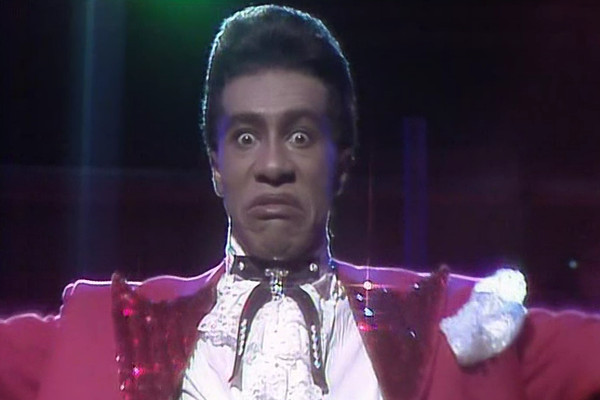
Parallel Universe has an "end of term" feel to it, whereby after four very good episodes (and one decent one) the cast are allowed to bow out of series two with a somewhat silly finale. Featuring the crew meeting female versions of themselves, some of the "gender politics" routines seem incredibly trite today, and broad, but what makes the episode is the interaction between the regulars.
Now familiar with their characters and in possession of good timing with each other, with the behind-the-scenes tensions adding to the dynamic. At this stage it seemed as if Red Dwarf was going to go on to be a consistently great series, but sadly Lovett bowed out, and Hattie Hayridge's replacement Holly was an odd fit for the somewhat "boy's club" dynamic of the show. Although the series still went on to produce many fine instalments, it was a very different kind of series, with a different feel.
While the discussions about dating between Rimmer and Lister are funny (if a little out of character for what we've previously learnt about Rimmer), it does begin to grind to a halt when the female opposites are introduced. While it has its moments, it becomes too much of a "one joke" situation... something that can be levelled at the next episode, series three's Backwards. Notable, though, is that John-Jules gets to break the fourth wall when he first sees the Dog, the first time the fourth wall has been broken in the series... if you don't count all the times Charles looked out to the audience during series one. A fairly amusing end to a silly episode sees one of the very few times where Cat actively enjoys Rimmer's company, enthused by Lister's predicament and Rimmer winding him up over it.
Perhaps the most unsettling part of the episode is the opening "Tongue Tied" dream sequence... while a catchy song and a fairly amusing sequence (albeit with Charles milking his part somewhat), it now unfortunately brings to mind the woeful single version by John-Jules, which was released five years to the day after this episode aired, and got to a mighty No.17 in the UK charts. It's quite inexplicable what prompted the release so long after its appearance in an episode, as by the time it was brought out, Red Dwarf had just begun series six, and was a very different programme...
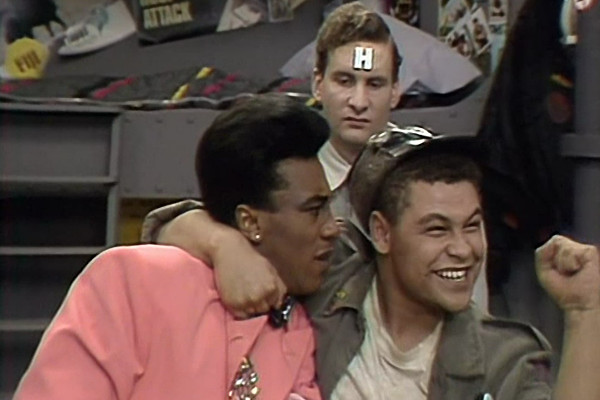
Red Dwarf series one has arguably the most integrity out of any Red Dwarf series, a time when the writers were all about ideas rather than selling T-Shirts. It's not the funniest series, of course - almost the opposite, in fact - but it has ideas and genuine charm. This isn't a series resting on its laurels and plunging into tired one-liners, it's a show trying to plough an original path. It doesn't quite come off, the production values are cheap, the editing haphazard and the sight of Lister smoking is now anachronistic, but this is a series that was trying to do something fairly NEW.
One curious element of the early Red Dwarf episodes is the honest reaction of the audience. While the audience laughter is always genuine, in later seriess the laughter heard may not be for the take used, and set reports regularly tell tales of the production staff urging the audience to laugh louder for the recordings. Here in the first episode the audience seem unsure what reaction to give at points, most notably on Lister's "what's an iguana?" line, and the ending, which is an inspired episode in need of a genuine punchline.
The chemistry between the cast that could sell even a lesser episode is yet to fully emerge, and while Norman Lovett's Holly is fully formed here, he's not given adequate screentime to compensate for the hit-and-miss (and surprisingly, in hindsight, aggressive) interactions between Lister and Rimmer.
The first episode has seen a number of edits and changes over the years... quite apart from the truly appalling "Remastered" version, the version streamed on Netflix features the music to George's funeral changed from "See You Later, Alligator" to "Here We Go", presumably due to right issues.
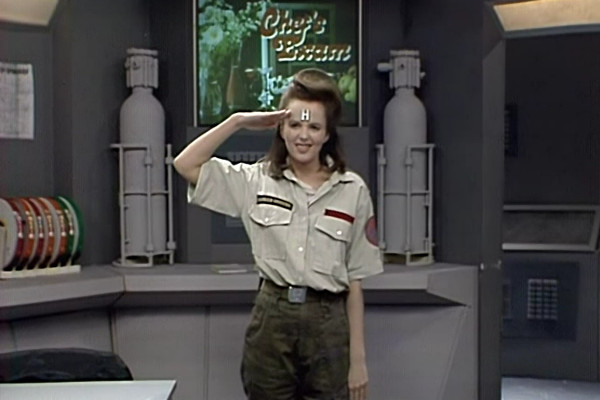
Balance of Power and Waiting For God aren't highly regarded by the writers of the series, with both feeling they were weak scripts and inferior to the unmade, incomplete series one script Bodysnatcher. Bodysnatcher (completed as narrated storyboards for a DVD extra) is more "high concept", featuring Rimmer building a patchwork body. In contrast, Balance of Power is a study of the Lister-Rimmer dynamic, with series one Rimmer far more obnoxious than the more sympathetic version he would become.
It's indicative of how the writers would make things easier for themselves at the expense of the core concept: Balance of Power features two characters who can't touch anything, a third who only wants to touch things if they're food (or shiny things), and a fourth who is emotionally isolated. Getting laughs out of the feeling of loneliness is hard work, but the beauty of series one Red Dwarf is that it was never about the plots... indeed, the absence of strong plots and the mundanity of ship life was the plot. It must also be noted that with Future Echoes being brought forward to second in the running order, it detracts from the narrative flow of this story... Balance of Power has to be watched very much as a follow-up to The End in order to be really appreciated.
Another notable element of this underrated episode is how Red Dwarf is one of the few shows to begin under the shadow of the pejorative "political correctness" and then reject it later into its run, rather than the reverse. Although Lister still gets in a line about the French, his respect for women and revulsion at how Rimmer mistreats the hologrammatic Kochanski is in stark contrast to the later, horrendous series eight, where, as previously discussed, he regretted not sleeping with her under the influence of drugs. Astonishing that a programme made in 1999 could be far less enlightened and inspired than one made way back in 1988...
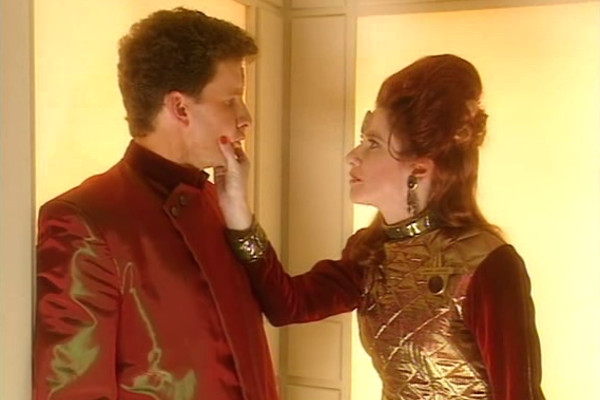
Holoship was never an especially popular episode among the series' fans, even though it has many funny moments and much to offer. Perhaps it's that the establishment of the "Red Dwarf" posse is now fully in effect, with many of the episodes cutting back on the Rimmer-Lister dynamic. Or maybe it's just that it lacks that "opening episode" feel.
Certainly it's very much a solo Rimmer episode in many senses, with Chris Barrie interacting with guest stars rather than his usual co-stars for the most part. (Rimmer's amusing parting line of "people I... met" was Barrie's own suggestion). Although none of the DVD commentaries could perhaps be described as "essential", Holoship is more amusing than most, as Craig Charles's absence due to illness means that not only does Hattie get more of a word in, but Barrie impersonates Charles throughout, affectionately mocking his need for all the good lines.

With Grant-Naylor refilming and heavily editing all the episodes directed by Juliet May, she was let go after four episodes and the direction of Quarantine/Back To Reality was taken over by the writers. A "bottle" episode there to save money, it's nevertheless dramatic and contains some strong sequences as Rimmer is driven temporarily insane by a holovirus.
Most of the best Red Dwarf episodes are dialogue-based, and, while this one is a little overrated and not quite up there, it's still a strong entry. It's also the first, and, so far, only appearance of Mr. Flibble, a character who has so far not joined Duane Dibley in being overexposed and rehashed to death, at least outside of the Smegazine, where he'd regularly feature in cartoons. Just one sticking point... would the vain Cat really wear a gingham dress, even to taunt Rimmer?
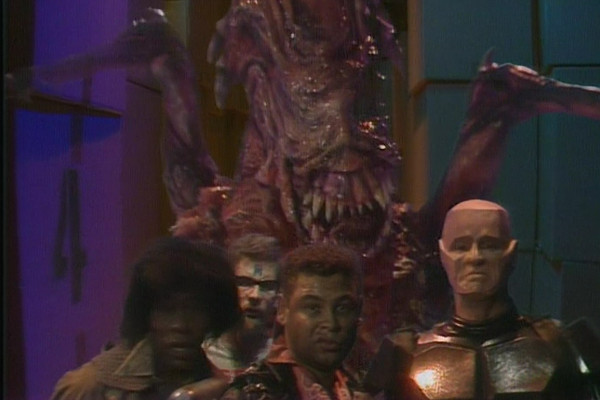
Polymorph is the first Red Dwarf episode to introduce GELFs, or Genetically Engineered Life Forms, which are, after all is said and done, aliens by any other name. Suddenly Lister is no longer the last man alive in a Godless universe, but just the last human in a very populated environment, with a further ten appearances from "GELFS" to date. This, their first and best, sees a shape-changing creature that has been much repeated throughout the series. It testifies to more-dialogue based episodes that moments that were, on transmission, hilarious, such as the infamous Lister and Kryten boxer shorts scene, now hold up less well than the verbal gags... or maybe it's just that Rimmer's "bonk" is an antiquated 80s term that died with Moonlighting.
Generally though, this still holds up as a pretty amusing episode of Red Dwarf, even if it feels less energetic than the time it aired. This is still Red Dwarf very much with an audience who chooses when to laugh, rather than laugh uproariously at every single line, and so it's notable that in amongst the amusing crew alteregos, Cat's "vanity free" hobo gets only vague chuckles from a more discerning audience.
Despite being significantly more advanced, production-wise, than the first two seriess, there's still a lot of fun with the low production values, including a Goodiesesque "snake"... though Barrie and Charles note on the commentary that the microwave joke isn't really a "Red Dwarf gag". What is also notable is how "soft" and grainy the picture quality sometimes looks, as pictured, byproducts of the more primitive editing process 30 years ago, which saw the video stock degrade with each fresh edit.
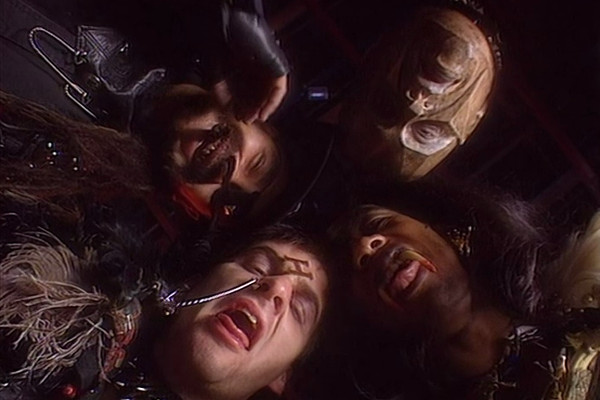
With regular director Ed Bye leaving the series to work with his wife Ruby Wax, comedy director Juliet May was brought in to take over during series five. Unfortunately her lack of experience with science fiction saw her struggle, and Grant-Naylor take over direction for many of the episodes, often finishing them heavily in the edit suite. May described her time on the official website as going "tits-up", and starting her time on Red Dwarf with a split-screen intensive production was the very definition of jumping in at the deep end.
Red Dwarf, certainly with the Grant-Naylor episodes, was quite a progressive show, and so very few of the gags can be regarded as unpalatable today. And while it would be foolish to place modern sensibilities on something even as comparatively recent as 1992, it's curious that what would be today regarded as mild homophobia can be seen in some episodes, particularly with Rimmer's character. Only in the previous year he had questioned Ace Rimmer's sexuality or asked a wax droid soldier if he was "queer", so it's almost like an intended continuity point that Rimmer's inner nature produces a version of himself with homosexual tendencies. That this is also seen as being his "dark" side is another debate for another time. There's also some continuity issues with the episode, such as how Lister still remembers playing pool with planets after the time was undone (White Hole), or how his evil self and remote control still exist after everything has been restored to normal.
While series five looks slicker than before, helped by an increased budget and vastly improved special effects, there's an argument to be had that it should no longer be a studio sitcom with the increase in dramatic events. Here the audience laugh at three strawberries, and even Lister's higher self being stabbed to death. Demons and Angels is a good episode, and the low selves are horrifying, but in terms of out-and-out laughs it's more of a drama. Consequently the audience laughter can feel intrusive, particularly as it clashes badly with the poor editing on display. (Note also that a boom mike can be seen in at least two shots).
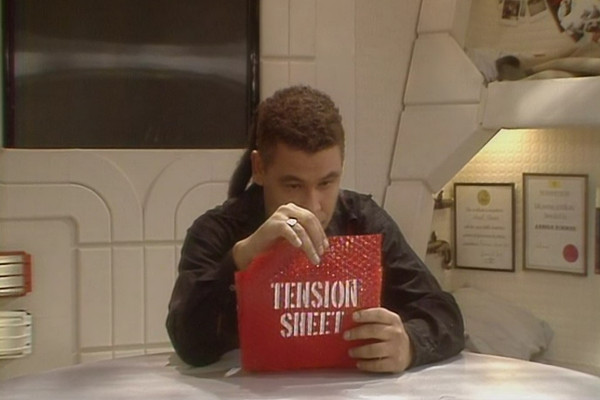
Timeslides has probably the most ludicrous plot for a Red Dwarf episode, but it works because it's based around something very tangible. While having mutated developing fluid that can cause time rifts in old photos is deeply silly, it begins as an exploration of Lister's loneliness, and ends with the somewhat tragic payoff that Rimmer has come back to life but dies again. The episode also featured a role for Graham Chapman, but he was replaced by Ruby Wax (the director's wife) as Chapman sadly died before rehearsals.
It's somewhat sketchy, and sometimes stodgily directed - a dance scene with Rimmer is inexplicably shot in close-up - but there's a lot of pay offs. Some of the continuity doesn't always work out, and not just the fact that Craig Charles's real-life brother playing him as a 17-year-old is clearly at least a couple of inches taller. If the episode is taken completely seriously, then there's no reason why a 17-year-old Lister of c. 2071 would be playing gigs in a pub that looks like it comes from the 1980s, and there's no reason why Rimmer would still exist as a hologram if Lister was removed from the timeline.
Such shaky logic saw Craig Charles advise that the dialogue of the skiiers in a photograph should be removed as they wouldn't be aware of having their photograph mixed up with Lister's at the time they were snapped. But this was still Red Dwarf when it was a comedy series first, SF series second, and so commendably such things weren't allowed to cloud the issue. Timeslides is a good episode with some memorable dialogue, though the "reset to zero" ending can't help but make it all feel a little inconsequential...
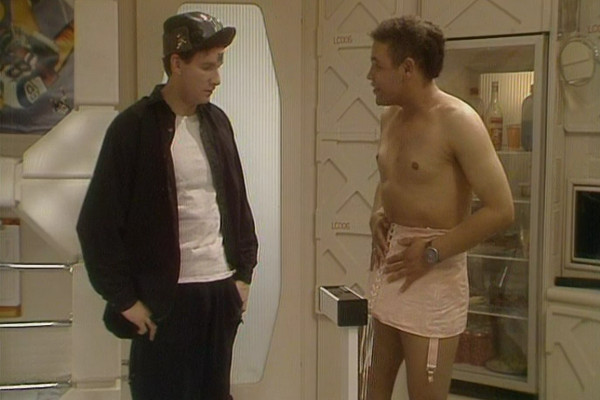
Whether or not the real-life antagonism between Charles and Barrie (c. 1988-1993) was a good thing for the series or not is open to question. Certainly the pair, if reports are to be believed, never had the same antagonism from series seven onwards, but the same period also marks solo Doug Naylor scripts, so the quality of material wasn't there. Such thoughts come to the forefront with Bodyswap, an amusing episode that saw Charles infuriated with Barrie impersonating him. Despite this, it's a commendably vanity-free performance from Charles, who appears semi-naked throughout, with much derision thrown at his physique.
Filmed without a studio audience and screened later for the laugh track, it sees lots of dubbing as Rimmer's mind gets to take over Lister's body. Lister having his entire mind extracted in seconds is a recall of a joke used in Thanks For The Memory, and was most recently run into the ground in series 12's Siliconia. The lack of studio audience and uncertain dubbing does take away a lot of the atmosphere and make the whole venture seem strangely "off", but it's a good instalment with some highlights. Perhaps most notably, Rimmer's speech in the episode about weight gain was sampled two years later by Carter the Unstoppable Sex Machine on their album track Surfin' USM.
Series three isn't a good series for Danny John-Jules, as not only does he get little to do and his real accent frequently leaks through, but he loses most of his cat-like qualities, features which never returned. However, Bodyswap gives him a little more to do than most of the other five instalments, including the Scrabble game and the final punchline. The Remastered version sees extra footage of this routine, with John-Jules hamming it up and playing with the food, pretending part of it is fake eyes...